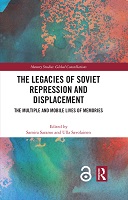Chapter 10 Complicity in Commemoration
Proposal review
The “Traumatic Enfilade” in the Work of Maria Stepanova
Abstract
The chapter reads Maria Stepanova’s 2017 Памяти памяти (In Memory of Memory, 2021) in view of the boom of testimonies of involvement in twentieth-century mass violence in Central and Eastern European literatures. Why this interest now? Hypothesis is that the texts address convergences between past complicities and current forms of participation in the wrongdoings of neoliberalism. These issues are related, since justifications of past involvement established the terminology, narratives, and heuristics in which mass violence has been subsequently discussed, thus forming the frame for the negotiation of current problematic involvement. Stepanova’s text stands out from the large corpus of contemporary family history narratives. First, it inverts the common order of critical discourse, as the literary text discusses theoretical concepts of memory studies, most notably Hirsch’s “postmemory.” Secondly, this discussion challenges a Western bias of memory studies, where political violence is portrayed as a traumatizing element of a past era handed down through transgenerational transmission. Stepanova outlines that in Eastern Europe, the experience of totalitarian terror and mass violence spread over several eras and multiple generations, creating a “traumatic enfilade” that comprises even the narrator’s present. In Memory of Memory addresses the critical participation of analysis in forming the aftermath of terror and mass violence.
Keywords
complicity, participation, implication, transgenerational trauma, remediationDOI
10.4324/9781003305569-15ISBN
9781032305257, 9781032305264, 9781003305569Publisher
Taylor & FrancisPublisher website
https://taylorandfrancis.com/Publication date and place
2023Imprint
RoutledgeClassification
Sociology
Politics and government


 Download
Download